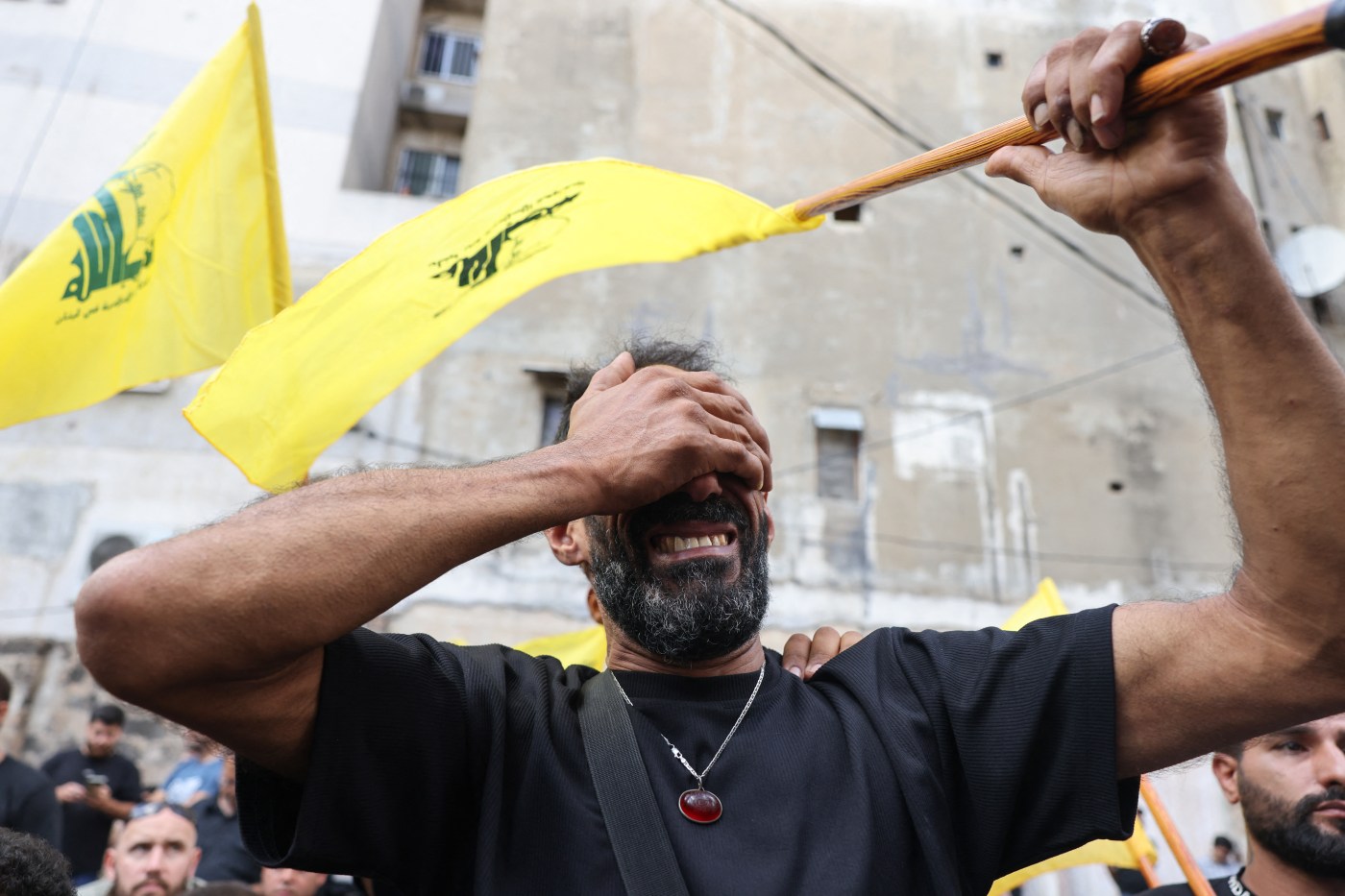
David French: Iran is losing. That may matter more than Israel’s mistakes
Military defeats matter. Israel’s inexcusable complacency on Oct. 7, 2023, allowed Hamas, a terrorist force with a small fraction of the military strength of the Israel Defense Forces, to kill more Israeli civilians than the vast armies of Egypt and Syria and their allies did at the height of the Arab-Israeli wars of 1967 and 1973.
But as demonstrated by Israel’s stunning airstrike on Friday on Hezbollah’s underground headquarters near Beirut, which killed the group’s leader, Hassan Nasrallah, the fortunes of war have shifted against Israel’s enemies since Oct. 7. Hamas is losing. Hezbollah is losing. And most important: By extension, Iran is losing. If those losses continue Iran will exit this conflict as a diminished force, less capable of harming Israel and weaker in the eyes of its other regional foes.
To say that Iran and its proxies have faced battlefield reversals is not to minimize the terrible costs to Israel. Parts of the north have been depopulated by Hezbollah rocket fire. Israel is facing a storm of international condemnation for the violence of its response to Hamas. And there are obvious internal strains on the nation and the military. Even if Israel ultimately wins this war, it will have paid a dreadful price.
But my own military experience in Iraq taught me that public understanding often lags behind battlefield realities. An understandable focus on politics and diplomacy can distract the public from the battlefield — and the battlefield is telling a different story than it did at the beginning of this fight. Israel’s enemies have made profound mistakes and taken terrible losses. These military reversals may well end up having more enduring consequences for them than for Israel.
Hamas, which receives considerable military and financial support from Iran, has been gutted as a fighting force. Precise casualty numbers are difficult to discern, but they are significant. As of late last month, Israel claimed it has killed as many as 17,000 Hamas fighters and “dismantled” 22 of its 24 battalions, while losing fewer than 1,000 soldiers in action in almost a full year of war.
Hamas isn’t defeated, and there is some evidence that some of its battalions are attempting to reconstitute. But the damage to the group is undeniably extensive, and Hamas has been unable to inflict significant losses on the Israeli military.
I share my colleague Thomas Friedman’s concerns that Israel will probably face an insurgency after it defeats Hamas’ military formations. But the present reality is clear: Hamas is a shell of its former self.
Hezbollah also still maintains a very substantial fighting force in Lebanon, but Israel’s strike against Nasrallah is but one of a series of devastating attacks on Iran’s most powerful proxy army.
On Sept. 17, Israel reportedly orchestrated an attack in which thousands of pagers detonated in the hands and pockets of Hezbollah operatives. The next day Israel reportedly detonated hand-held radios that Hezbollah also used to communicate, and then executed a devastating airstrike on an in-person meeting of Hezbollah leaders, killing several of its senior officials.
Then, on Sept. 23, Israel carried out a series of attacks on what it said were Hezbollah positions that killed more than 500 people. Israel claimed that the attacks damaged or destroyed thousands of Hezbollah rockets and missiles, and Hezbollah’s response was ineffectual.
And what of Iran? It has suffered a string of defeats and humiliations. In April, Israel bombed the Iranian Embassy compound in Damascus, Syria, killing three senior Iranian commanders. When Iran responded by firing a barrage of more than 300 drones and ballistic missiles at Israel, Israel and its allies shot almost all of them down. Damage from the strike was minimal. Israel responded with an attack of its own that easily evaded Iranian air defenses.
The message was clear: Israel can directly strike Iran, but Iran will struggle to strike Israel.
But the humiliations for Iran weren’t over yet. In July, Israel assassinated Ismail Haniyeh, the chair of the Hamas political bureau, reportedly by smuggling a bomb into a Revolutionary Guard guesthouse in Tehran, a shocking penetration of Iranian security.
Israel hasn’t defeated its enemies. Hamas is diminished, but it still exists. Hezbollah reportedly still possesses tens of thousands of rockets and missiles, and it still menaces the Israeli north. Iran also possesses an extensive missile arsenal and retains its influence over proxy forces across the Middle East. The fortunes of war can certainly change once again.
Also, one can certainly argue that Iran and its proxies have advanced several nonmilitary objectives in their fight against Israel. Israel’s diplomatic momentum in the Middle East has stalled. Its hoped-for rapprochement with Saudi Arabia is on hold. And it appears to be more isolated on the world stage.
But consider the ways in which Israel has improved its military position since Oct. 7. Before the war, it lived essentially with two cocked pistols at its borders: Hamas and Hezbollah. Now one of those forces is largely smashed and the other has lost many members of its senior leadership and many of its rockets, missiles and rocket launchers.
In addition, I question whether Iran’s nonmilitary successes are as real as they seem. Given the enmity between Saudi Arabia and Iran, it’s presumptuous to say that Oct. 7 actually extinguished (rather than postponed) an Israeli-Saudi diplomatic breakthrough. And one wonders how isolated Israel truly is when its allies and neighbors — including not just the United States but also Britain and, reportedly, Jordan — helped Israel defend itself against Iranian attack.
There’s no question that the Biden administration has been harshly critical of Israel on many occasions, but its actions indicate little daylight between the two countries — especially in its confrontation with Iran.
In August, the Biden administration approved a $20 billion arms deal with Israel that will allow it to purchase 50 new F-15IA fighters from the United States (helping ensure its qualitative military edge for a generation). And there is currently a huge American naval buildup in the region. The American Navy is fighting Iran-backed Houthi rebels in the Red Sea and attempting to deter Iran from launching fresh attacks against Israel.
During my deployment, I learned an important lesson about the West’s jihadi enemies: Defeat demoralizes them. It’s not that their resistance collapses entirely, but jihadism waxes and wanes depending on its battlefield success.
When the United States turned the tide during the surge in Iraq in 2007 and 2008, al-Qaida in Iraq struggled to replace its losses and ultimately diminished to a fraction of its former strength. By the end of my deployment in 2008, there were Qaida terrorists who eagerly surrendered to our forces in the field. (One Qaida commander even walked to the gate of our base and turned himself in.) Far fewer people are flocking to the Islamic State group banner after its caliphate was crushed in 2017. After Hezbollah’s bloody 2006 war with Israel, Nasrallah even expressed regret for the kidnappings that ignited the conflict.
While military success doesn’t always bring true peace, it can preserve societies. South Korea thrives, for example, despite a decades-old frozen conflict with North Korea. A military shield has kept Taiwan free. Israel’s victories haven’t brought permanent peace, but they have preserved the nation and enabled its extraordinary prosperity.
I’m sobered when people I respect lament the condition of Israeli society (especially its settler movement in the West Bank) and the dysfunction of its politics. I grieve the staggering loss of innocent life. But one year after perhaps Israel’s worst military failure, its military success is guaranteeing that Israel, not Iran, remains the captain of its fate.
David French writes a column for the New York Times.
Related Articles
Melinda Henneberger: In praise of childless women I know who make this a better world
Column: The nation’s movie theaters are getting a $2B makeover. Now it’s up to the movies to make it pay off
Trudy Rubin: Will Biden seize last chance for tougher policy on Gaza deal and Ukraine victory?
Bret Stephens: Hezbollah is everyone’s problem
Lisa Jarvis: Oregon had a bold plan to help drug addicts. Then fentanyl showed up

